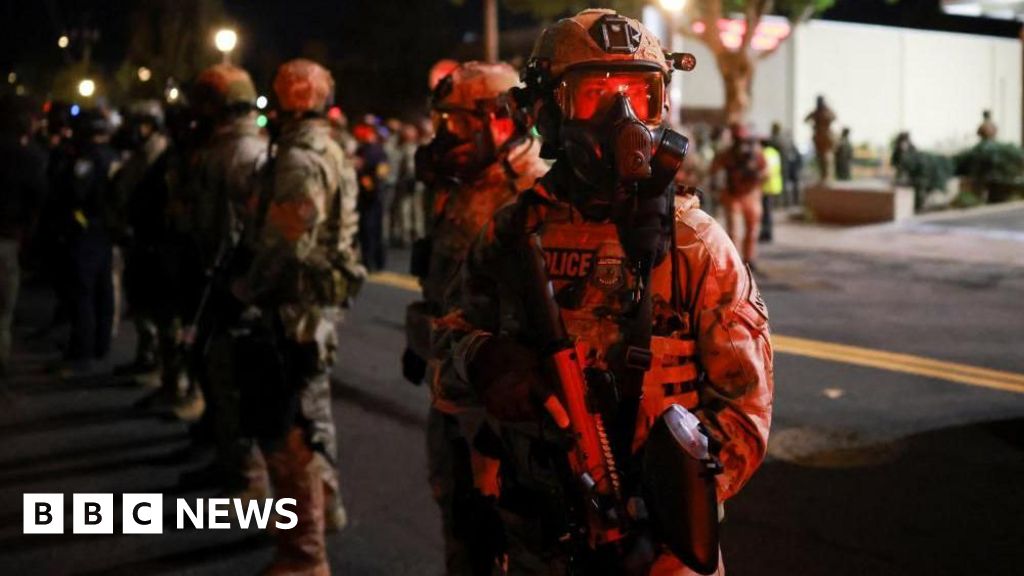
A US judge has ruled that President Donald Trump cannot deploy National Guard members to Portland, Oregon, marking a significant development in the ongoing legal battles over federal intervention in local matters. The decision, delivered by US District Judge Karin Immergut, makes permanent a temporary order that had previously blocked the deployment.
The ruling is the culmination of weeks of legal wrangling over whether the president overstepped his authority by sending federal troops to a US city against the wishes of local officials. This decision is particularly notable as it is the first time the Trump administration has been permanently barred from deploying troops to a city.
Background of the Legal Battle
The controversy began as part of the Trump administration’s broader efforts to manage protests against federal immigration policies in cities with Democratic leadership, such as Chicago, Los Angeles, and Washington DC. The administration has argued that federal intervention is necessary to protect federal assets and personnel amid what they describe as violent unrest.
Judge Immergut, appointed by Trump, initially issued two temporary restraining orders. One prevented the president from mobilizing the Oregon National Guard to Portland, while the other broader order stopped him from sending troops from any other state, including California and Texas, to Oregon.
Legal Justifications and Constitutional Concerns
In her comprehensive 106-page ruling, Judge Immergut clarified that her decision does not prevent the president from ever using National Guard troops. However, she emphasized that in the case of Portland, “the President did not have a lawful basis to federalize the National Guard.” She noted that there was no rebellion or imminent threat of rebellion justifying such deployment.
The judge further stated that President Trump had violated the 10th Amendment of the US Constitution, which reserves powers not delegated to the federal government to the states. She deferred to higher courts to establish a clear standard for when a president can deploy military forces in American cities, but concluded, “wherever this line precisely is, defendants have failed to clear it.”
Reactions and Implications
The ruling has sparked varied reactions from different stakeholders. The Department of Justice has described Portland as “war-ravaged,” citing violent incidents at a local immigration detention facility. “As we have always maintained, President Trump is exercising his lawful authority to protect federal assets and personnel following violent riots that local leaders have refused to address,” the White House stated.
Conversely, local officials and many Portland residents argue that the violence is not as widespread as portrayed and is being effectively managed by local police forces. Portland’s attorney, Caroline Turco, framed the issue as a fundamental question of governance, stating, “This case is about whether we are a nation of constitutional law or martial law.”
Historical Context and Expert Opinions
The case echoes historical tensions between federal and state powers in the US. Legal experts have pointed out that the federal government’s ability to intervene in state affairs has been a contentious issue since the country’s founding. This ruling may set a precedent for future cases involving federal intervention in local matters.
According to constitutional law expert Dr. Samuel Greene, “This decision underscores the importance of maintaining a balance between federal authority and state sovereignty. It is a reminder that even in times of unrest, constitutional limits must be respected.”
Future Prospects and Potential Appeals
The Trump administration is widely expected to appeal Judge Immergut’s decision, potentially escalating the matter to the Supreme Court. The outcome of such an appeal could have far-reaching implications for the balance of power between federal and state governments.
Meanwhile, the situation in Portland continues to evolve, with ongoing debates over the appropriate level of federal involvement in local law enforcement. As the legal process unfolds, the nation watches closely, aware that the resolution of this case could influence federal-state relations for years to come.
The next steps in this legal saga remain uncertain, but the ruling has undoubtedly intensified the national conversation about the limits of presidential power and the role of federal forces in domestic affairs.







